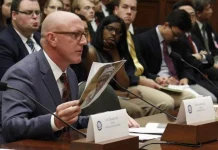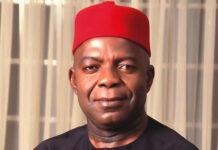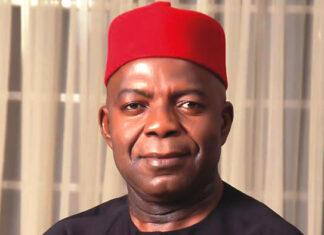- Hawk Chinese fabrics in Idumota, Kweri Textile Markets
*Render 30,000 dyers, traders jobless
A fresh strategy in the Chinese weird business model in Nigeria aimed principally at sabotaging the nation’s economy has been uncovered in Lagos. The latest drive has been described by multiple sources in business and security circles, as a direct assault on the nation’s economy and security.
The incursion of Chinese businessmen into Nigeria’s retail market started since early 2000, but their recent audacity of moving out of their trading enclaves (China Towns) and taking over shops hitherto owned by Nigerians, and also hawking their wares from place to place is a recent phenomenon that Nigerian traders are raising the alarm about.
The latest culprit, Zhe Long, owned by two Chinese: Wang Fuzeng and Chen Yuping, has as its main objective: “to carry on business as manufacturer, buyers, sellers, traders, importers, exporters and merchant exporters.”
The company, according to search at the Corporate Affairs Commission, was incorporated in Nigeria on the 11th January, 2018 with an official address at 4, Eric Moore road, Surulere, Lagos.
Investigation revealed that the perfidy from Zhe Long ranges from false declaration, security breaches, tax evasion, forgery, illegal immigration, concealment and customs duty evasion.
For instance, security agencies have discovered that the commercial that sales invoices of the company is not VAT compliance since there are no VAT number and amount declared on the document. This to tax experts, constitutes a serious breach of the law by Zhe Long and its customers.
Apart from this, investigation also revealed that there are about 30 Chinese semi-skilled/manual workers operating in the company. A source in the company revealed that none of these workers has a formal Combined Expatriate Residence Permit and Aliens Card, CERPAC documentation, which is clear breach of the nation’s immigration law by both company and the illegal immigrants.
The CERPAC GREEN CARD is a bonafide document that allows a non-Nigerian to reside in Nigeria and carry out an approved activity as specified in the permit, or to accompany a resident or citizen of Nigeria as a dependant.
In the areas of import and shipping documentations, sources revealed that Zhe has been falsely declaring a chemical known as Polyol as Polyacetals. Polyols are a group of low-digestible carbohydrates derived from the hydrogenation of their sugar or syrup
Polyols react with isocyanates to make polyurethanes, which find use to make mattresses, foam insulation for refrigerators and freezers, home and automotive seats, elastomeric shoe soles, fibers (e.g. Spandex), and adhesives.
On the other hand, polyacetal is an engineering thermoplastic used in precision parts requiring high stiffness, low friction, and excellent dimensional stability. It is among plastic materials, with the most crystalline structure. It is also is known for its good fatigue/creep resistance, low friction and good performance in cold temperature.
Sources at the Customs explained that the reason for this false declaration is that Polyacetals global pricing is US$600/metric tonnes as against US$2,000 Polyol.
Similar to the above, the company is also accused of declaring a chemical called TDI as Toluene. Global pricing of Toluene is US$600 as against TDI’s US$2,300
The consequence of this false declaration according to experts, is duty under-payment and the consequent defrauding of the government of necessary duty and VAT on these transactions.
Aside the loss of revenue accruing to the government, there is major security implication for the false declaration of TDI. Apart from a chemical used in the production of polyurethanes, primarily for flexible foam applications including furniture, bedding and carpet underlay, as well as packaging applications, TDI is also used in the manufacture of coatings, sealants, adhesives and elastomers.
But due to TDI’s potential explosive properties, the material is a controlled substance that requires an End User Certificate, EUC issued by the office of the National Security Adviser, NSA for its importation to Nigeria.
Sources close to the company alleged that presently there is no evidence to support that Zhe Long has EUC for its TDI’s importation, which according to security experts, constitute a serious national security breach.
Meanwhile, a group of traders and dyers in Kano at the popular Kweri Textile Market, under the aegis of Masu Rini Progressive Association, recently held a protest march against the Chinese traders in the market, accusing them of taking over their source of livelihood.
The traders, who marched from Kori Market to the Emir of Kano’s Palace, carried different placards with inscriptions such as: “We don’t want China products in Kano again”, “Government should stop China from exploiting us”, “Chinese textiles are killing our market”.
Addressing newsmen at the Emir’s Palace, the Secretary of the Dyers Association Yakubu Lawal Ishaq, said that the Chinese may soon render over 30,000 dyers and traders jobless if government provides them with the enabling environment they are looking for, which is total takeover of the market.
Yakubu alleged that the China made fabrics had crashed the price of the locally made ones and rendered textile business unprofitable for the indigenous products.
He further lamented that “initially, the Chinese were mainly in the sale of white fabrics and chemicals for the manufacturing of textiles but suddenly they started selling low quality products to us and later they started importing the same textile we produce here. They have also spoilt the price. For instance if we sell for N3000, the Chinese people will sell their own for N2000!”
Although the dyers did not advocate for outright expulsion of the Chinese fabrics in the state, they called for the enforcement of the Nigerian Enterprise Promotion Act and International Trade Policy to regulate indiscriminate infiltration of Chinese fabrics into Kano markets
Speaking to the protesters, the Emir of Kano, Mal. Muhammadu Sanusi II cautioned that they should refrain from any act capable of resulting to violence in the course of agitating over their plight.
While exonerating the Chinese of any blame for the massive importation of their products into the country, and the looming danger of them taking the nation’s retail business, the emir condemned what he described as the Federal Government’s negligence in the handling of illegal goods into the country.
Emir Sanusi, pledged to intervene in the matter, and further urged the local dyers and traders to be patient and to resist any attempt that would lead to untold attack on the Chinese in Kano.
We exclusively learnt that the Chinese traders have taken over every inch of the Kweri market, retailing and hawking imported Chinese fabrics in the market.
A businessman in the market confirmed to our correspondent that the Chinese traders apart from having enough capital to do the business, they have the comparative advantage over the local traders, they Chinese textiles cost less compared with the locally made ones, they also attract more patronage due to their refined texture.
However, in Lagos, Mr. John Obi, a dealer in textile materials at the Idumota Market on the Lagos Island, expressed fear that Chinese traders might soon push them out of the market because, the nationals from the Asian country have started importing them into Nigeria and further taking over the retail of textile materials in Idumota and other markets in Lagos.
“What you see in Idumota now are Chinese porters carrying textile materials on their heads from the wholesale shops to retail outlets in the market.
“If nothing is done to check this development, many Nigerian retailers will be pushed out of the market,” he warned.
Our investigation also show that the Chinese nationals are in their numbers in the markets in Lagos and are slowly taking over the electronic distribution business in the country, including sale of phones at the Ikeja Computer Market.
Our correspondent reports that the Chinese were frequently seen on Lagos streets selling their hair and other beauty products to the final consumers on the Island.
Speaking on the development, a Lagos-based Miner and Financial Consultant, Mr. Mecha Udo said that the activities of the Chinese in the mining sector could even be said to be more alarming than what is happening in any other sector of the economy. He disclosed that the Chinese have taken over most of the mining pits in the country; extracting valuable raw materials which they send to their country for processing.
In Nigeria, as in much of Africa, Chinese investment provokes suspicion. But according to Mr Ye Shuijin, President, China Chambers of Commerce in Nigeria, the quantum of investment in the Nigerian economy by Chinese companies has hit $20 billion U.S dollars. This I from160 Chinese firms operating in the country which also employed over 200,000 Nigerians.
There is also a large population of Chinese people in Nigeria which comprise Chinese expatriates and descendants born in Nigeria with Chinese ancestry. As at 2012, there are approximately 20,000 Chinese in Nigeria.
Like many Nigerians, John Bolton, President Donald Trump’s national security adviser, has accused China of using “bribes, opaque agreements and the strategic use of debt to hold states in Africa captive to Beijing’s wishes and demands”
The Chinese however countered that “Nigeria has the most thieves in the world,” says Thomas Liu, who runs the medicine company, using the sort of uncompromising language that grates from Accra to Kinshasa. “You have to avoid being tricked.”
Chinese businessmen also claimed they have to negotiate past Nigeria’s bureaucratic gatekeepers for permits and licences. “To visit a government official here, you best have around $6,000 to $10,000 with you,” says Mr Ban, a miner. “Otherwise, forget about getting an appointment.”


























